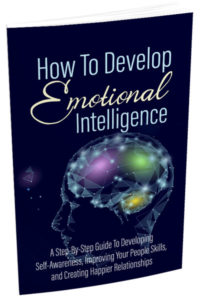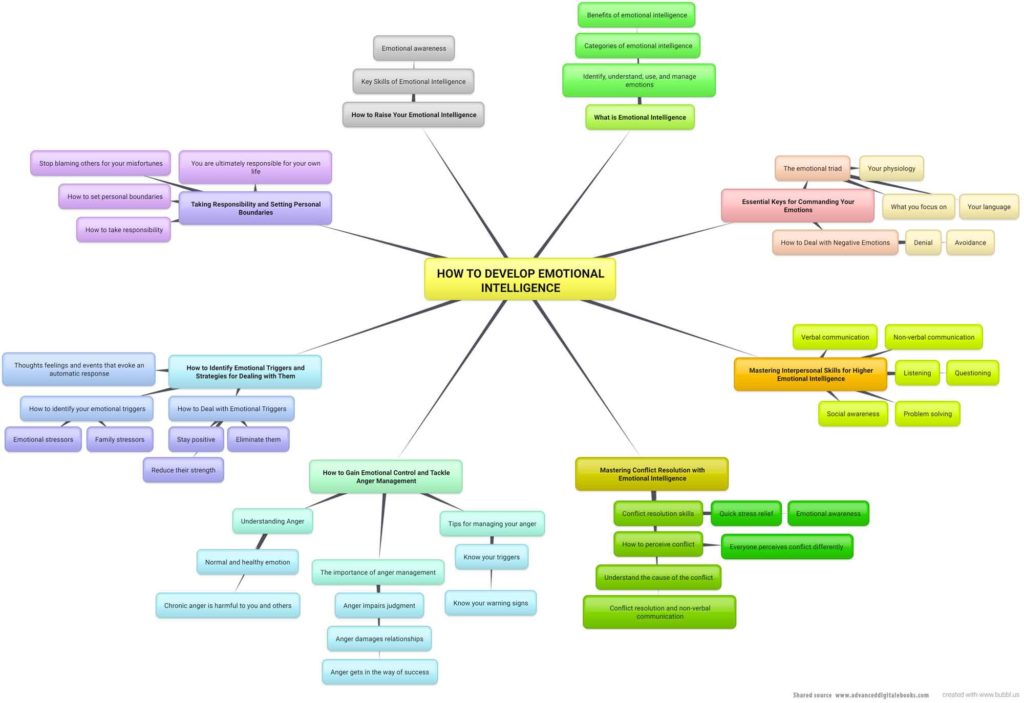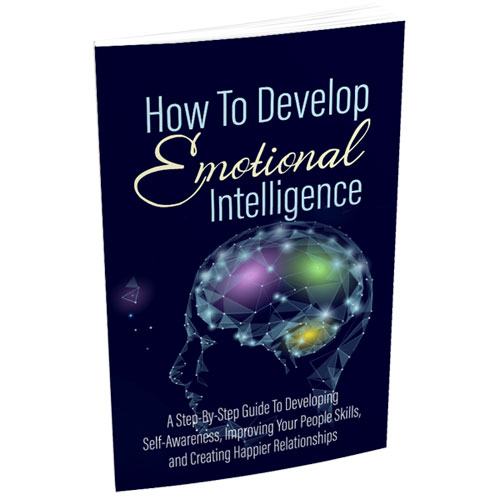Discover What Emotional Intelligence Skills Are and How To Use
If You’re Looking for a Simple step-by-step guide to EQ, this guide is for you.
Emotional intelligence Skills (EQ) are the ability to recognize our feelings and those of others.
It also means understanding what triggers certain emotions in people and how to use that knowledge to improve relationships with them.
- Are you interested in developing self-awareness, improving people skills, and creating long-term happier relationships?
- Did you know that by developing your EQ, you could work more efficiently toward achieving better results?
- Did you know that many employers are now evaluating employees’ EQ skills to help them improve productivity, communication, and negotiations in the workplace?
By learning how to develop Emotional intelligence skills, you will ultimately be in a better position to develop your confidence and competence.
The benefits of improving your Emotional intelligence will include the following results:
- Improved Personal Effectiveness
- Improved Thinking Skills
- Improved Goal Setting Skills
- Improved Professional Relationships
- Improved Leadership Capability
- Better Mental and Physical Well-Being
- Improved Conflict Management Skills
- Better Successful results

So what is Emotional Intelligence really about?
Emotional intelligence (EQ) is about one’s ability to connect with emotions to identify, understand, and positively manage their actions with others to work towards overcoming challenges and achieving better results for all involved.
How easy is Emotional Intelligence to learn?
Like any skill, there is a step-by-step process to learn the logistics and technicalities from a conscious level through a subconscious level to be able to automatically respond appropriately in different situations that require an awareness of EQ. There are five different categories of Emotional Intelligence. Each one requires some thought to be aware of and then practice. These categories are self-awareness, self-regulation, motivation, empathy, and social skills.
Why is Emotional Intelligence really important to be aware of and practice?
One way to explore why emotional intelligence is important to learn is by looking at the typical dysfunctional workplace staff motives that often have conflicts of interest that interfere with productivity, create stress, and reduce personnel satisfaction. By being aware of the benefits of emotional intelligence, there is a better potential for effective communication and productivity.
Why is emotional intelligence important in the workplace
In the workplace, emotional intelligence is essential for employees to be successful. It helps them to interact with others in a positive and productive manner and to build meaningful relationships.
It also helps people understand how their emotions can impact their decision-making processes, which can lead to better outcomes.
With emotional intelligence, employees can better manage stress, foster collaboration, and improve communication with their colleagues. Emotional intelligence is vital in creating a workplace environment where everyone feels comfortable and respected.
What are the 5 competencies of emotional intelligence?
As seen in the diagram above, the five areas of emotional intelligence skills you need to learn are self-Awareness, Self-Regulation, Motivation, Empathy and Social Skills.

The consequences of low levels of EQ within a workplace include poor productivity, personnel anger, poor team performance, constant auguring, blame game, resistance to learning new ways of thinking and doing, unable to face adversity, or exploring a mindset for finding new solutions to ongoing problems.
Some examples of quality EQ in the workplace include better productivity for all involved due to better social interactions, compassionate support, open personal expression, a mutual amount of staff focus for finding creative solutions, and more flexibility within work objectives.
If the above concerns resonate with you in relation to past experiences and you would like to explore a way forward to learn about the benefits of Emotional Intelligence for personal development and contributing to a more productive workplace environment, the digital book “How to Develop Emotional Intelligence“ outlined on this page will be of interest to you.
This comprehensive guide offers a thorough outline for developing self-awareness, improving people and communication skills, and ultimately creating happier relationships.
The Essential Skills for Commanding Your Emotions
Learning to control your emotions is an essential skill for mastering your life. Focusing on understanding why you do certain things can be a powerful tool for altering your emotional state and creating positive change. People often strive to achieve big-picture ideals such as financial security, physical fitness, or fashion statements because they feel a sense of accomplishment when they reach their goals.
People who believe that pursuing their goals will help them to become more confident and ultimately attract success into their lives will go the extra mile to do what is needed. Emotions are fundamental to our existence and are to be embraced, not pushed away. Acknowledge emotions to consider what they can teach you and discover the knowledge hidden within them.
The Table of Contents of this book about how to improve Emotional Intelligence skills
- Introduction
- What is Emotional Intelligence
- Categories of Emotional Intelligence
- Self-Awareness
- Self-Regulation
- Motivation
- Empathy
- Social Skills
- Benefits of High Emotional Intelligence
- Categories of Emotional Intelligence
- How to Identify Emotional Triggers and Strategies for Dealing with Them
- How to Identify Your Emotional Triggers
- How to Deal with Emotional Triggers
- Why You Need to Take Responsibility and Set Personal Boundaries
- How to Take Responsibility
- How to Set Your Personal Boundaries
- How to Raise Your Emotional Intelligence
- Key Skills of Emotional Intelligence
- Essential Keys for Commanding Your Emotions
- The Emotional Triad
- How to Deal with Negative Emotions
- How to Gain Emotional Control and Tackle Anger Management
- Understanding Anger
- The Importance of Anger Management
- Tips for Managing Your Anger
- Mastering Conflict Resolution with Emotional Intelligence
- Understanding the Cause of Conflict
- How to Perceive Conflict
- Conflict Resolution Skills
- Conflict Resolution and Non-Verbal Communication
- Mastering Your Interpersonal Skills for Higher Emotional Intelligence
- Verbal Communication
- Non-Verbal Communication
- Conclusion
The book also includes an extra chapter on the top 5 ways to boost your emotional intelligence, an EQ Mind Map outline of the thought process, and an external resources section.
Here’s what you’ll learn reading this book about EQ:
- Learn about EQ and its benefits to help you improve life’s results.
- Learn how to identify emotional triggers and use strategies for dealing with them!
- Why do you need to take responsibility for your actions and be able to set personal boundaries to improve your communication with EQ?
- Explore various strategies for raising your EQ.
- Discover the essential keys to commanding your emotions.
- How to gain emotional control to be able to tackle anger management.
- How to respond and master conflict resolution with EQ awareness.
- How to explore and improve your interpersonal skills with higher EQ.
- Learn about and understand five essential categories that makeup EQ.
- Learn how to set up personal boundaries to help you maintain control over your emotions.
- Explore and practice effective strategies for dealing with negative emotions that can quickly sabotage your results.
- Learn about the importance of anger management while raising your EQ.
Also Included in this offer
- BONUS #1: Point-By-Point EQ Checklist
- BONUS #2: EQ Resource Cheat Sheet
- BONUS #3: A Mindmap of the EQ Thought Process

References:
- Wikipedia: Emotional intelligence (EQ) is most often defined as the ability to perceive, use, understand, manage, and handle emotions.
- emotional intelligence definition by Daniel Goleman
- For further reference about the origins of Emotional Intelligence in print, refer to “Emotional Intelligence: Why It Can Matter More Than IQ” in a 1995 book by Daniel Goleman







